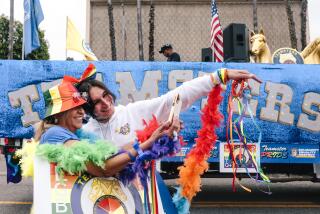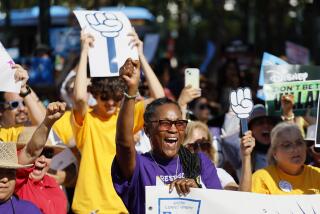Teamster Delegates Override Leaders on 2 Key Issues
ORLANDO, Fla. â Delegates to the Teamsters union convention on Thursday twice voted against the unionâs leadership, passing constitutional reform amendments long sought by Teamsters for a Democratic Union, the dissident organization whose ideas had been laughed out of previous conventions.
Delegates voted to more than quadruple the unionâs meager strike benefits to $200 a week from $45.
They also passed a constitutional amendment giving members the right to vote on regionally negotiated âsupplementsâ to national contracts. These supplements are often critical because they spell out work rules and determine how workersâ pay is determined. In the past, these supplements were imposed by union leaders based on national negotiations.
In addition, delegates nominated three candidates--union Vice Presidents R.V. Durham and Walter Shea and reformer Ron Carey--to run for president in Decemberâs rank-and-file election.
Durham won more than half the vote.
The conventionâs constitutional amendment committee, composed of top executives, had put forth an amendment that would have increased strike benefits to $100 a week.
However, an unusual political alliance of delegates loyal to the presidential campaigns of Carey and Shea supported doubling that proposal.
âWe should tell members weâre going to pay you $200 to win the . . . strike!â John Morris, a Shea supporter and the top Teamster leader in Pennsylvania, told delegates, calling the committeeâs proposal âMickey Mouse.â
As was the case Wednesday, when the convention voted to curb high salaries paid to union executives, the strike-pay vote reflected how court-ordered democratic rules that govern the Teamsters union are affecting policy decisions.
The past two conventions in 1981 and 1986--free of political turmoil and tightly under the leadersâ control--allowed strike benefits to rise by only $10.
On Thursday, the $100-a-week increase proposal was put forth by supporters of Durham, whose backers control the way the convention is run. Delegates from Careyâs campaign introduced an amendment to raise benefits to $150 after a strike reached four weeks. Then delegates from Sheaâs campaign introduced a flat $200-a-week level, which passed.
More to Read
Go beyond the scoreboard
Get the latest on L.A.'s teams in the daily Sports Report newsletter.
You may occasionally receive promotional content from the Los Angeles Times.










